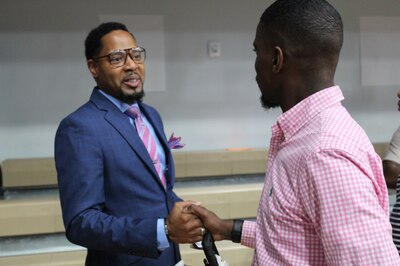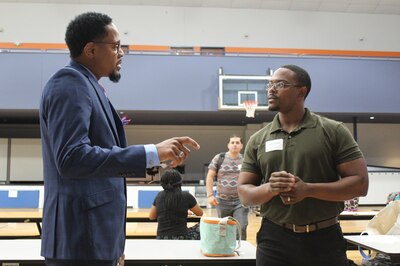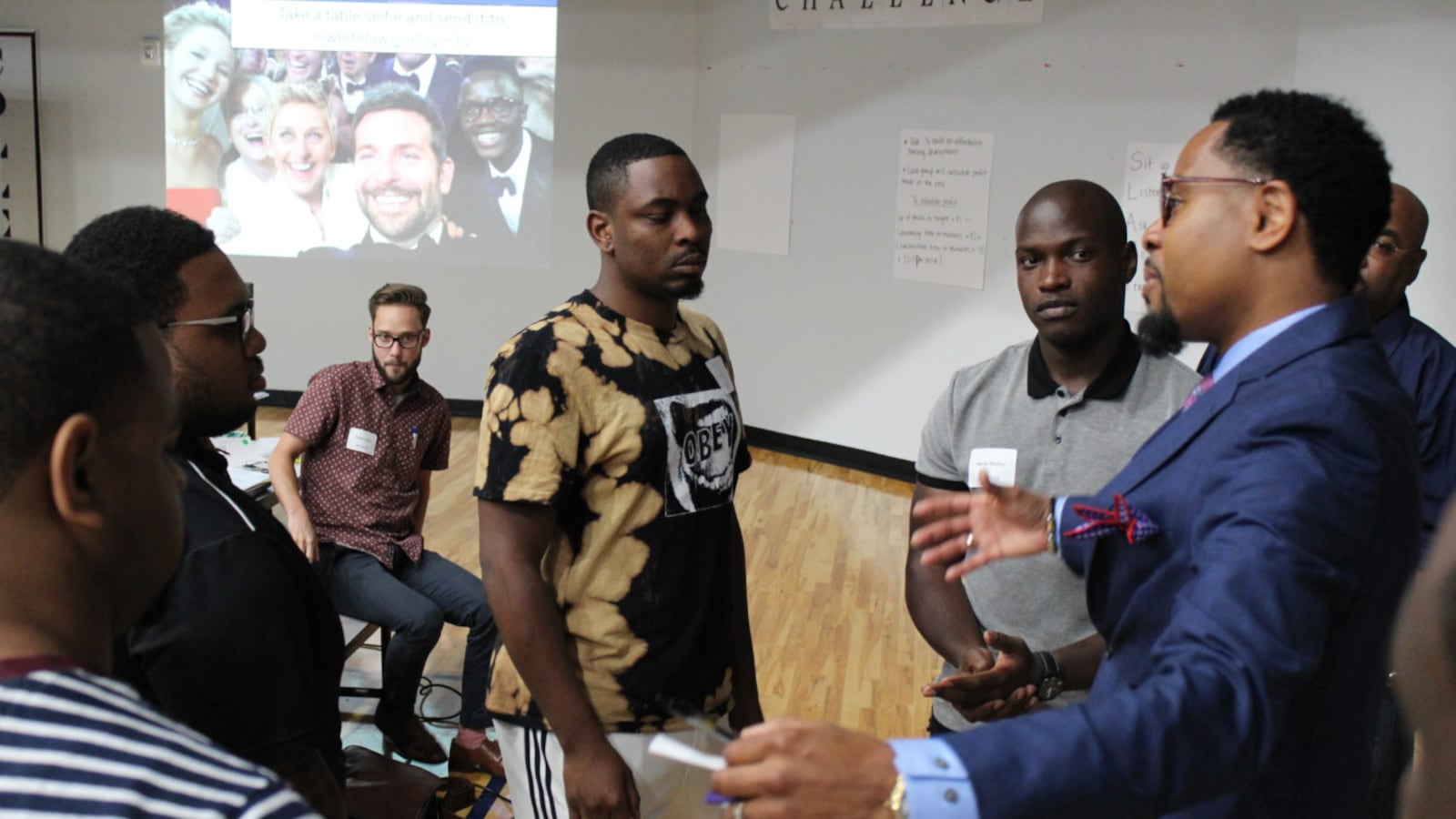Patrick Washington has teaching in his blood.
Washington’s great-great-grandfather, Richard Adkins, was born a slave in Marshall County, Mississippi. After the Civil War, Adkins, who was separated from his parents early on, worked as a sharecropper. Despite long hours picking cotton, he learned to read and write.
Soon after, Adkins taught other former slaves to do the same. He did so just years after anti-literacy laws, which forbade the education of slaves, were abolished. And he did so, Washington believes, because he imagined a better life for his children and grandchildren.
“He saw me,” Washington, a Memphis-based teacher and school administrator, said.
For Washington, 43, teaching is “the best profession on this side of heaven,” and it’s all he ever wanted to do. But he wishes more men of color saw the promise of a career in education. That’s why he’s partnering with Relay Graduate School of Education and Blue Mountain College on a new Memphis-based teacher preparation program called Man Up.
The goal: Train more men of color from various walks of life to become teachers in Memphis, and provide them with mentorship along the way.
According to a 2016 study by the U.S. Department of Education, black males make up just 2 percent of the teaching workforce nationwide. Statewide, that number is nearly the same, and in Shelby County Schools, men of color make up about 9.5 percent of teachers.
That lack of classroom representation, Washington believes, is often internalized by male students of color.
“That’s why they raise their hand and say, ‘Hey, I want to play basketball; I want to be a rapper; I want to be a policeman,’” Washington said. “Because that’s what they see.”
He said some are also dissuaded because they perceive teaching as a low-paid, low-status career.
Two years into his first teaching job at Memphis’ Evans Elementary, Washington was the school’s only teacher of color. And, over the next ten years, as Washington took on administrative roles at two other area schools, he noticed a pattern: There were few black male teachers, if there were any at all.
Those experiences, he said, were socially isolating. He also said that at schools that disproportionately discipline black male students, male teachers of color often find themselves in the role of disciplinarian. He said that here in Memphis, single mothers of boys have come to him, seeking behavioral support because they see him as a “father figure.”

Were schools to employ more teachers of color, they would be less likely to enact the kind of zero-tolerance disciplinary policies that have often fallen on Washington to enforce, he said. A study from the Center for Education Data & Research seems to support that theory; it found that students were 46 percent more likely to be seen as disruptive by a teacher of another race.
Man Up seeks to help diversify the teaching force by providing accepted applicants with a fully funded teacher preparation program, thanks to grants and philanthropic dollars. In exchange for free training, participants agree to spend at least five years teaching. In addition to their salaries, they receive annual $5,000 stipends.
The program, he said, will eventually have five different tracks to help men of color obtain teaching licenses. Those so-called “lanes” are:
The Graduate Lane: For recent college graduates, this program enables trainees, studying towards their master’s degree in education, to teach alongside a mentor teacher over a two-year period.
The Undergraduate Lane: Man Up is currently exploring a partnership with the University of Memphis, where the program would identify aspiring teachers among undergraduate students and provide them tuition assistance to complete their licensing requirements, alongside their degrees.
The High School Lane: This track would identify high school juniors and seniors with an interest in becoming teachers. It will pair them with non-profit organizations like the Boys and Girls Clubs of America, with the goal of helping them develop mentoring skills. They would also attend monthly seminars, similar to introductory education courses, and they would get hands-on practice in the classroom. After enrolling in a partnering college or university, students would move up to the Undergraduate Lane and graduate with up to six years of classroom experience.
The Teach 2nd Lane: This track would be for career changers — specifically retired servicemen or businessmen. They would attend a five-week boot camp, enroll in a partnering college or university, and take part in monthly Man Up sessions while gaining classroom teaching experience over the course of two school years.
The REVERSE Lane: In an effort to reverse the school-to-prison pipeline, Man Up hopes to partner with local Departments of Correction to identify men with expungeable misdemeanor offenses who aspire to teach. These students would enroll at a partnering college or university, where they would be required to attend monthly Man Up sessions, teaching labs, and a summer intensive course before receiving a teaching license.
The only track currently on offer is the Graduate Lane, which currently has three open slots for its 10-member cohort. So far, seven recent college graduates have begun summer training sessions at Freedom Preparatory Academy in Memphis, where they will work with Washington and Relay staff to complete a two-year curriculum.

Washington said he intends to expand graduate cohorts by five each year, reaching his goal of training 30 new male teachers of color annually by 2023. By the fall of 2019, Washington plans to roll out the next four tracks in concert with nearby colleges.
David Tillman, who recently graduated with a degree in exercise science from the University of Memphis, is among the current graduate cohort. He first heard about Man-Up after asking about a teaching position at Promise Academy, a local charter school that was founded by Washington.
Tillman, whose mother is a retired teacher, said he was drawn to teaching because “I understood the struggles of the students, especially students of color in the school systems, and I wanted to find a way to give back.” He remembered how one of his middle school teachers, a black man, saw that a young Tillman had potential but was “hanging out with the wrong crowd.” The teacher, who was also Tillman’s football coach, used to remind Tillman that he was a leader.
“He actually believed in me,” he said. “He spent a lot of one-on-one time with me, and that meant a lot to me, because I grew up without a father. So, he was that male, father-figure role model for me.”
Tilllman now wants to be that kind of mentor to Memphis students.
“Boys can see that, yes, it is ‘cool’ to be a teacher,” he said.
Alongside their graduate coursework from Relay, Tillman and his fellow trainees will spend two years co-teaching small groups of students and will meet monthly with Washington, who will provide supplementary training in areas such as reflection and feedback, results-driven teaching, and empathy and compassion.
Current Man Up participants are expected to mentor students or color, to identify practices to improve black male academic success, and to develop lessons for special needs learners.
While completing their training, Man Up graduates will be paired with a mentor, who is a male educator of color, which will continue as they begin full-time teaching.
“With 2 percent of the classroom population,” Washington said, referring to the percentage of black male educators, “we have a collective responsibility to each other, we have a collective responsibility to our country, we have a collective responsibility to our communities, and we have a collective responsibility to our kids. This is something that we must do.”

